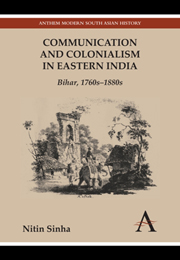Book contents
- Frontmatter
- Contents
- Acknowledgements
- List of Abbreviations
- Glossary
- List of Tables and Illustrations
- Introduction
- Chapter 1 From Affective Forms to Objectification: Spatial Transition from Pre-colonial to Colonial Times
- Chapter 2 India and its Interiors
- Chapter 3 Going into the Interiors
- Chapter 4 Knowing the Ways
- Chapter 5 Controlling the Routes
- Chapter 6 Changing Regime of Communication, 1820s–60s
- Chapter 7 Of Men and Commodities
- Chapter 8 The Wheels of Change
- Conclusion
- Bibliography
- Index
- Frontmatter
- Contents
- Acknowledgements
- List of Abbreviations
- Glossary
- List of Tables and Illustrations
- Introduction
- Chapter 1 From Affective Forms to Objectification: Spatial Transition from Pre-colonial to Colonial Times
- Chapter 2 India and its Interiors
- Chapter 3 Going into the Interiors
- Chapter 4 Knowing the Ways
- Chapter 5 Controlling the Routes
- Chapter 6 Changing Regime of Communication, 1820s–60s
- Chapter 7 Of Men and Commodities
- Chapter 8 The Wheels of Change
- Conclusion
- Bibliography
- Index
Summary
In December 1853, a British officer (whose name we do not know) started his journey from Calcutta towards the Parasnath Hill. He set off in a palanquin, which did not prove very useful because of the poor state of the road. He crossed the ferry at the Hooghly river and proceeded towards the coalfields of Burdwan. All the while he reported on the conditions of roads and bridges, the prospects of railways, topographical details, the beautiful scenery, the Hindu temples and the nature of villages and people. On 26 December he started for the hill from the village of Madhupur where he had hired three native guides (coolies), Kethu aged 18 (‘very active and loquacious’), Nilu aged 28 (‘very careful and active’) and Narain aged 25 (‘modest and not conspicuous’). While climbing, these guides started talking about their ascent the previous year, made with four sahibs who lived on the hill for ten days. The sahibs ate fowls and eggs and drank wine. This memory evoked loud laughter among the three guides. Our anonymous traveller suspected that some of those fowls and wine found their way to the guides and that in describing this previous journey they were actually making an indirect appeal to his liberality. For a moment, he paused to think about the caste taboos (which would theoretically regulate dietary practices) but then reasoned: ‘What have poor coolies to do with caste?’
- Type
- Chapter
- Information
- Communication and Colonialism in Eastern IndiaBihar, 1760s-1880s, pp. xvii - xxxviiiPublisher: Anthem PressPrint publication year: 2012
- 1
- Cited by



